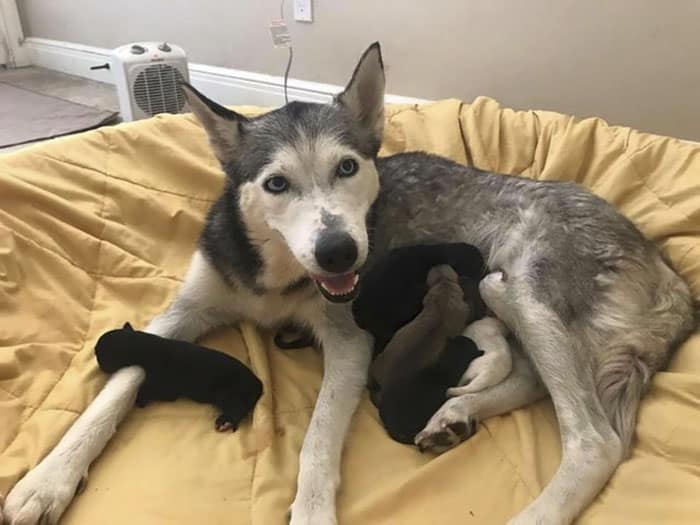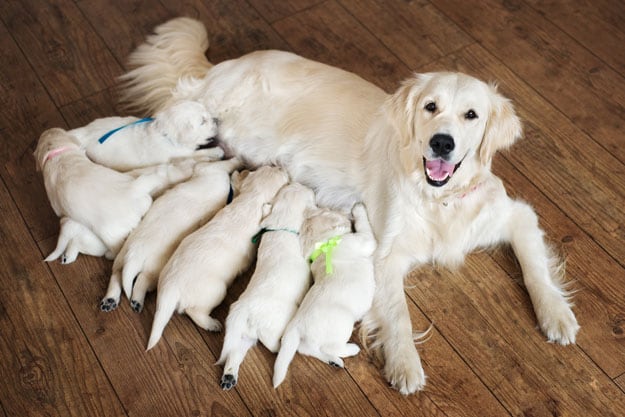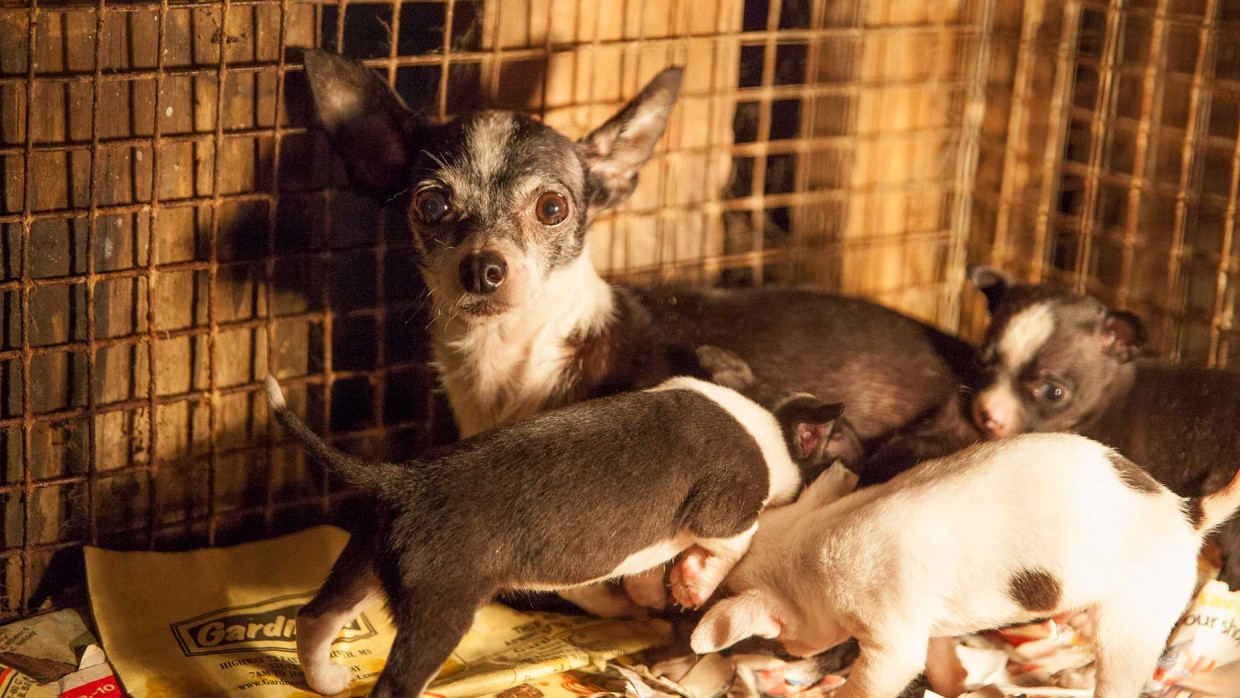The joy of witnessing newly delivered pups is inexplicable.
You no longer are burdened with the dangers of pregnancy and can now start enjoying the mischievous pups.
But there is a caveat—the mother dog still needs to raise them first.
For the most part, the motherly instincts will kick in and the dog will do a wonderful job of caring for her puppies.
However, there are some cases where the dog may not do such a great job.
Some may even openly show disdain for one or more of their puppies.
Why Does A Mother Dog Separate One Puppy From The Rest?

Even though the motherly instinct between a mother dog and her puppies is very strong, there are still some cases where the mother will pick on one of the pups and even try separating it from the others.
There are a couple of reasons why your dog may separate one puppy from the rest. These are:
1. Medical Issue
A mother dog may reject one of her puppies if the puppy has a medical condition that causes it to look or smell different from the other puppies.
A mother dog’s sense of smell is very keen, and she may be able to detect differences in the scent of her puppies.
If one puppy has a medical condition that causes it to have a different scent or appearance, the mother may reject it because it does not look or smell like the other puppies in the litter.
According to Dr. Scott Nimo, you can resolve this by rubbing some poop from the other puppies on the one that is being rejected. This will make the puppy to smell like the other puppies and the mother may stop rejecting her.
A mother’s health could also contribute to this behavior. For instance, dogs that have C-sections are more likely to reject a puppy than those that go through normal delivery.
The reason is it takes longer for the C-section wound to heal and it can take a toll on the mother who is also trying to breastfeed.
This will make some mothers aggressive towards some of their puppies and they may even reject one or more of them.
Boston Terriers, French and English Bulldogs, as well as other brachycephalic breeds, are especially notorious for this habit.
2. A New Environment
Some studies suggest that changing the dog’s environment during pregnancy can also affect how the dog carries the pregnancy and how she raises her pups.
The change can be stressful to the dog, which will cause hormonal changes in the mother that can impact her behavior and her ability to care for her puppies.
For example, if a pregnant dog is moved to a new home or introduced to new people or animals, she may experience stress and anxiety, which can affect her hormonal balance and her ability to bond with and care for her puppies.
Some dogs may react to this by rejecting one of their puppies.
However, it also depends on other factors, such as the dog’s previous experiences, her overall health, and the severity and duration of the changes in her environment.
It is always best to minimize the stress for a pregnant dog and keep the environment stable and familiar during this time.
3. The Puppy Seems Too Weak
It is also possible for a bitch to reject a weak puppy because she is instinctively trying to ensure the survival of her strongest and healthiest offspring.
In the wild, a mother dog would need to prioritize the survival of her strongest puppies because resources, such as food and protection, are limited.
Also, the weak puppy may not be able to compete with the stronger puppies for milk, warmth, and attention from the mother, which could lead to the weak puppy being neglected and eventually rejected by the mother.
If a mother dog does reject a weak puppy, it is important for the puppy to receive immediate medical attention and to provide additional warmth, nutrition, and care.
The puppy may need to be bottle-fed until weaning age.
Related: Newborn Puppy Not Nursing: Causes, Signs of Trouble & What to Do
4. Lack of Maternal Instinct
A mother dog may also reject her puppies if she lacks maternal instincts.
Maternal instinct refers to the natural behaviors and instincts that drive a mother to care for and protect her offspring.
Some dogs may have a stronger maternal drive than others, and some dogs may have a weaker or absent maternal drive.
In some cases, a lack of maternal instincts in a mother dog can be due to a hormonal imbalance, physical or psychological issues, or lack of experience with breeding or caring for puppies.
Hormonal imbalances can be caused by a variety of factors, such as stress, infection, or disease.
It’s also possible that a dog may have never had the opportunity to develop maternal instincts.
For example, a young, inexperienced dog or a dog that has never been bred before may have a harder time adjusting to the demands of motherhood and may reject one or more of her puppies.
Does A Mother Dog Have A Favorite Puppy?

A mother dog may have a preference or a “favorite” puppy among her litter.
Like humans, animals can have different personalities and behaviors and may form bonds with certain individuals.
Also, a mother dog may give more attention and care to a certain puppy due to that puppy’s physical or behavioral characteristics, such as being more vocal, active, or affectionate.
It’s important to note that, a mother dog will naturally have a more intense and close bond with the puppies that feed more frequently, as nursing activates the hormones responsible for maternal bonding and attachment.
The puppies that nurse more frequently will get more grooming and other maternal behaviors from the mother.
Can A Mother Dog Reject One Puppy?
As we have already established, a mother dog can reject one or more of her puppies.
A mother dog may reject a puppy for a variety of reasons, such as the puppy being weak or sick, having a different scent or appearance, or experiencing a hormonal or emotional change due to stress or a medical condition.
When this happens, the rejected puppy may be fostered by another lactating bitch or he may also be bottle-fed.
Related: Tube Feeding Puppies: A Quick Guide for New Dog Owners
What Should You Do If Your Dog Rejects One Of Her Puppies?

If a mother dog is rejecting one or more of her puppies, there are a few things that can be done to try and intervene.
First, it’s important to make sure that the mother is healthy and able to care for her puppies.
If she has a medical condition that is preventing her from caring for them, it will be necessary to address that before trying to get her to accept the rejected puppies.
Next, try to spend more time with the mother and her puppies, as this can help her bond with them.
Ensure the puppies have a warm and clean space, adequate nutrition, and that they have been checked by a veterinarian
Also, attempt to feed the mother dog and the rejected puppy together, as this can help her associate the puppy with positive experiences.
In severe cases, it might be necessary to intervene more directly. This can involve fostering the puppy with another lactating mother dog, bottle feeding, or hand rearing.
Parting Thoughts
So, the next time you see a mother dog separating a pup from the rest, do not freak out.
Even though it is not normal behavior, it is something that happens and with good reason too.
You can always reach out to the vet for professional help.
Meanwhile, you may want to bottle-feed the rejected puppy just to be safe.
Related Posts:
Why Did My Dog Only Have One Puppy?
Can Puppies Be Born Days Apart?
As an Amazon Associate, we may receive a small commission from qualifying purchases but at no extra cost to you. Learn more. Amazon and the Amazon logo are trademarks of Amazon.com, Inc, or its affiliates.

